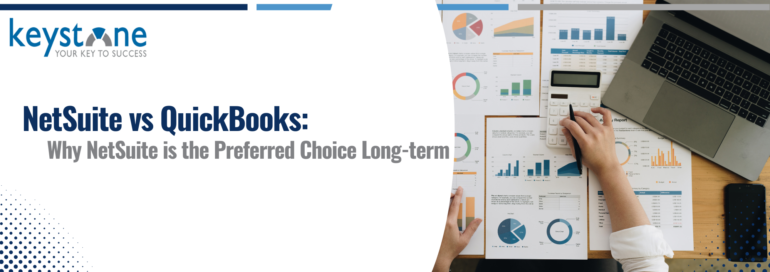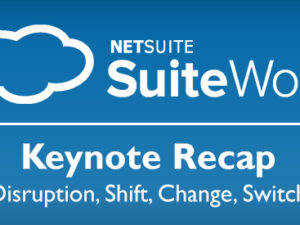
NetSuite vs QuickBooks: Why NetSuite is the Preferred Choice Long-term
Keith Spencer – ERP Consulting Manager, Keystone Business Services
People often ask the question whether to select QuickBooks or NetSuite as an ERP platform. QuickBooks is an accounting software package which only provides accounting functionality. Many companies will outgrow QuickBooks due to its limited functionality as just an accounting software tool. While NetSuite is a fully scalable ERP system. There are many reasons, I would select NetSuite over QuickBooks, for example, customized roles and permissions, accounts receivable functionality, and a fixed asset platform that meets IFRS requirements.
I will provide a synopsis of why I would pick NetSuite over QuickBooks. For businesses that are looking for the scalability of an ERP system through the growth of an organization, NetSuite is the obvious choice. The first factor is NetSuite Roles and Permissions. As an Administrator, NetSuite lets you assign customized roles based on user permissions which prevents users from having access to information that should not be available for their role. In QuickBooks you have preset roles which you can set high-level user permissions, but QuickBooks while having the ability to customize roles, does not have the user level segregation that NetSuite has with customized roles. In addition, QuickBooks only allows you to customize users in the online edition but not the desktop version. NetSuite only has one version of a single cloud solution and provides the ability to fully segregate your entire organization by allowing customization of roles with unique permissions. Both platforms provide an ability to audit the transaction activity. However, NetSuite provides a high level of governance, risk and compliance capabilities as your business grows. Something QuickBooks just can’t do.
Furthermore, with NetSuite being a complete enterprise resource planning tool it allows an organization to run most of its core business without any additional integrations. NetSuite has a Financial Module which includes real-time reporting, planning, and budgeting along with a streamlined close that follows accounting standards. In addition, NetSuite can perform multi-subsidiary consolidations. While QuickBooks has the capability to perform consolidated reporting, it is not as seamless as NetSuite’s. In QuickBooks you have 2 options to consolidate reporting, one, use the combined reports from multiple companies function or two, use a third-party software. Whereas in NetSuite you can run your consolidated reporting simply by selecting the consolidated subsidiary legal entity that is automatically created based on the hierarchy design from the report you would like to view as consolidated.
NetSuite has a fixed asset and leasing module that meets the IFRS 15 accounting standards. This module allows for the tracking of depreciating assets, capital assets, asset disposal and revaluation. In addition, the module has reporting that is specifically for fixed assets and leases. QuickBooks does not track depreciation expense, asset value nor the life span of assets. Furthermore, QuickBooks is not IFRS 15 complaint.
Now let’s talk Accounts Receivable. NetSuite has better A/R capabilities with Advanced Revenue Management to capture revenue over time based on contract renewal and milestone billing. QuickBooks is much more limited in scope. NetSuite allows you to automate data entry and billing processes to improve accuracy of financial statements. This allows businesses the flexibility to plan for future revenue and earnings.
NetSuite provides better insight into your business profitability with inventory management, warehouse management and supply chain management. With QuickBooks limitations, companies must layer on additional applications to be able to obtain the same insights into their business.
In closing NetSuite is built on the Cloud to meet most needs of a business in a single platform with limited integration in comparison to QuickBooks which is not as scalable or efficient.
![]()
Keystone. Your NetSuite solution provider and integration partner.
Call – 866-546-7227 | Email – info@kbscloud.net
 About Keith Spencer
About Keith Spencer
Keith is an ERP Consulting Manager at Keystone Business Services. He is a results-oriented leader with an extensive background in information systems, consulting and accounting. He possesses exceptional communication skills working with senior management and stakeholders to ensure projects are aligned with business needs. His ability to plan and execute projects according to strict deadlines and within budget is unmatchable. He exhibits strong analytical skills and a constant thirst for knowledge regarding products and services. Keith has many NetSuite Certifications including, NetSuite ERP Certification, NetSuite Certified SuiteFoundation, NetSuite Certified Financial User and NetSuite Multi-book Authorized.
Keith graduated from DePaul University– Chicago, Illinois with a BS in Accounting and Business Administration and a MBA in Business and Information Technology. Keith currently resides in Chicago, Illinois, where he enjoys playing golf, volunteering at Junior Achievement of Chicago, enjoying a bike ride on Lake Michigan and traveling. Keith is health conscious and enjoys weightlifting and boxing. He loves spending time with his grandmother.





